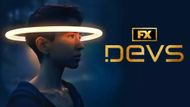The British fantasy TV show Black Mirror is mostly set in the realm of speculative fiction. The Charlie Brooker-created series is sci-fi set in a milieu of dystopia. The list below mentions similar web series as Black Mirror such as Westworld, Orphan Black, and Silo. These series confound viewers with unexpected plot developments that challenge their notion of reality.
Black Mirror won the Primetime Emmy Award for Outstanding Television Movie for its episodes, Bandersnatch, USS Callister, and San Junipero over three consecutive years. Each show employs original storytelling and detailed characterization to show how technology tests the nature of being human. The nine shows listed below combine dramat and robust themes to perplex viewers and inspire deep emotions.
**Disclaimer: This article is purely based on the writer's opinion. Readers' discretion is advised.**
9 shows like Black Mirror that twist your brain
9. Severance (2022)

The psychological thriller Severance, streaming on Apple TV+, is written by Dan Erickson and directed by Ben Stiller. According to the plot, Mark Scout (played by Adam Scott) is an employee at Lumon Industries, where the employees undergo a medical procedure that severs the memories of their world outside office from the memories of the workplace. Britt Lower plays Helly R., Zach Cherry is Dylan G., John Turturro plays Irving B., Christopher Walken is Burt G., and Patricia Arquette is Harmony Cobel.
A brain-twisting moment occurs when Helly R. finds out that she is, in fact, Helena Eagan, daughter of Lumon’s CEO. It shocks the audience by revealing Lumon Industries' advanced manipulation methods.
Such a portrayal of various personas, the corporate self, and the real self, reflects on themes found in Black Mirror. The surprising revelation became the series' feature, by challenging audience perception of identity and autonomy in corporate worlds.
8. Devs (2020)

The tense science fiction thriller miniseries Devs exclusively streams on Hulu. Alex Garland wrote the story. As per the plot, Sonoya Mizuno plays Lily Chan, a software engineer at the quantum computing startup, Amaya. Lily is the main focus of the narrative. Nick Offerman is Forest, the enigmatic CEO of Amaya. Alison Pill portrays Katie, the company's quantum physicist, and Jin Ha plays Jamie, Lily's ex-boyfriend.
The series introduces a shocking scene, in which Lily challenges the assumptions of Dev's system when she tests it by challenging its assumptions about preordained actions. Lily's defiance of the system's expectations shows that people are capable of making their own decisions.
That plot element reflects the basic issues in Black Mirror, about the influence of technology on people’s behavior. It generated discussions on how technology influences or predicts human choice, blurring the line between predestined and free will.
7. Altered Carbon (2018)

Altered Carbon is an American cyberpunk TV series. This TV show was produced by Laeta Kalogridis and is inspired by English novelist Richard K. Morgan's 2002 book of the same name. With the majority of the first season's episodes taking place in the futuristic metropolis of Bay City in the year 2384, the series begins 360 years in the future.
The story focused on Takeshi Kovacs, an army veteran who became an investigator. Joel Kinnaman played the character in Season 1 and Anthony Mackie in Season 2. After 250 years imprisonment, Kovacs is killed and revived in a different body to help clear the mystery of a wealthy man’s murder.
Laurens Bancroft, the very man whose murder Kovacs is looking into, has committed suicide a moment in advance, with his memories already backed up. This shocking turn puts Kovacs in a tricky place while probing the murder.
The discovery raises important issues about identity and memory, such as whether a person retains their essence even if they are unable to recall their past behavior. Viewers are drawn into the twist because it raises moral questions of immortality and the nature of identity, two keys points in Black Mirror.
6. The Peripheral (2022)

Based on William Gibson’s book, The Peripheral is an Amazon Prime television show. The plot is set in America of the near future where Chloë Grace Moretz's character, Flynne Fisher, uses a virtual reality headset to explore links with another planet. As she discusses exploring this unfamiliar area, she discovers a bleak future threatens her familiar world.
Flynne discovers that what she does today influences both the future and the present. The inclusion of these "stubs," or divergent timelines, adds intricacy to the plot, demonstrating that alternate realities might exist within each decision point.
This shocking new revelation interests spectators by delving into the repercussions of changing time and the interwoven thread of causal relationships between timelines, much like in Black Mirror.
5. Tomorrow and I (2024)

Tomorrow and I is an anthology series from Thailand that tells stories about technology and traditional culture in future Thailand. All four parts present separate narratives that analyze how technology affects people. The show casts an impressive group of performers, led by actors Pakorn Chatborirak, Waruntorn Paonil, Violette Wautier, Ray MacDonald, and Chananticha Chaipa.
The episode Black Sheep depicts the death of spaceman Noon shortly after he implants an artificial heart while in orbit. Since human cloning is illegal, Nont, who is grieving greatly over Noon's passing, requests that Dr. Vee replicate Noon. While the two attempt to move Noon’s memories to the clone, an important identity issue arises. The twist keeps the audience intrigued as it questions the ethics of cloning and the core of self, major themes in Black Mirror.
4. The OA (2016)

Brit Marling and Zal Batmanglij produced the Netflix mystery drama series, The OA. Having going missing for seven years, Marling's character Prairie Johnson reappears, renamed and renamed The OA. Jason Isaacs and Emory Cohen are also part of the series cast.
When Prairie reveals that she and others were able to reach other dimensions while they were almost killed in captivity, it ushers a significant change in the plot. She passes on to the group several exercises meant to allow entry into these other realms.
Like Black Mirror's plot, the show challenges viewers' beliefs about reality and what occurs after death, by fusing science fiction elements with spiritual themes.
3. Orphan Black (2013)

Tatiana Maslany in Orphan Black leads the cast, portraying several clones such as Sarah Manning, Beth, Cosima, Alison, and Helena. Once Sarah discovers she has been genetically duplicated, she is introduced to a world with many puzzles and personal discoveries. Sarah realizes that an unknown agency is monitoring them after discovering additional clones.
After they found out they had no true freedom and were test subjects, they began to reflect on how their sense of self was defined. While Black Mirror explores how technology affects individual identities, the theme is also reflected in the struggle for independence that Orphan Black's protagonists go through, and their experiences with cloning.
2. Silo (2023)

Apple TV+ streams the dystopian science fiction series Silo, which is based on Hugh Howey's novel trilogy. Rebecca Ferguson plays Juliette Nichols, an engineer who becomes the sheriff of a large silo inhabited by humanity’s survivors deep underground. David Oyelowo is Holston Becker, and Tim Robbins portrays Bernard Holland in the program. Juliette finds from the evidence that those in control have misled everyone about the realities on the surface.
Even though residents believe the surface is dangerous, proof suggests it might be safe. This makes people question the truth and reveals how easily trust can be lost between those in power and the rest of the community. The narrative twist pulls in viewers by looking at how leaders can exploit their power and misrepresent facts, mirroring the ideas of Black Mirror.
1. Westworld (2016)

The American dystopian science fiction Western drama television series Westworld is produced by Lisa Joy and Jonathan Nolan. The cast of Westworld is toplined by Evan Rachel Wood as Dolores Abernathy, Thandiwe Newton as Maeve Millay, Jeffrey Wright as Bernard Lowe, and Anthony Hopkins as Dr. Robert Ford. The show is set in a Wild West-themed amusement park with advanced technology and is filled with android hosts. The show analyzes the ethical ramifications of human impulses and the rise of artificial consciousness.
The discovery that Bernard Lowe is a host, a human-like android, is a crucial plot twist. The audience is prompted to explore identity and consciousness due to this discovery. The twist draws viewers in by exploring the blurred lines between human and machine, which is a central theme in Black Mirror.
We can conclude that every one of these shows included twists that greatly influenced not only the plot and characters, but also the audience. Viewers were shocked by each major plot twist due to the revelation of secrets, the uncertainty of identities, and the questionable use of technology. These works led viewers to ponder over important questions about corporate authority, the issue of cloning, and the inherent dangers of artificial intelligence.
Similar in a few ways to Black Mirror, these series blended unsettling themes with elaborate action, sparking discussions about freedom, self-identity, and the risks of progress. Their mind-bending scenes ensured they remained memorable long after their final credits.
